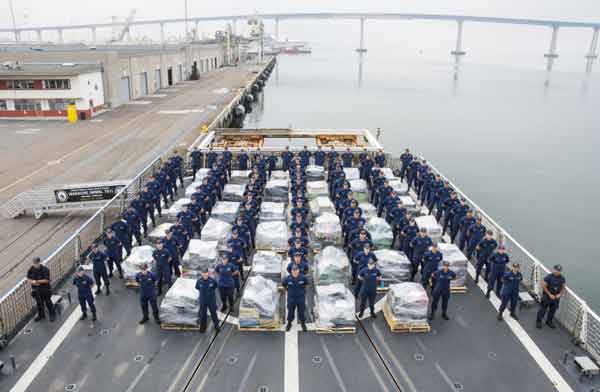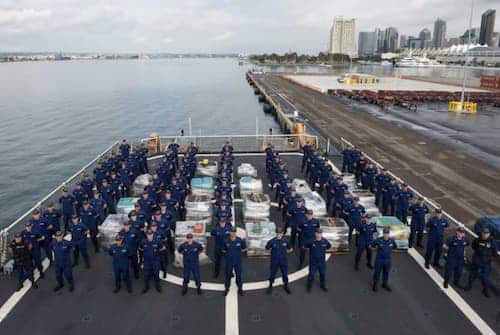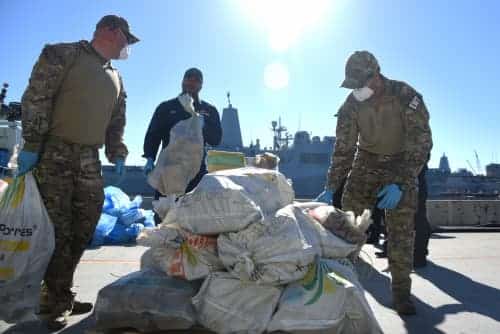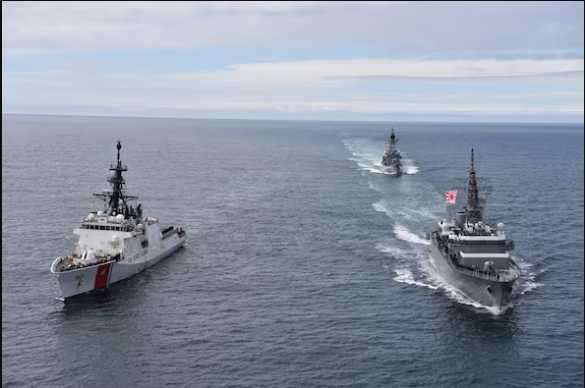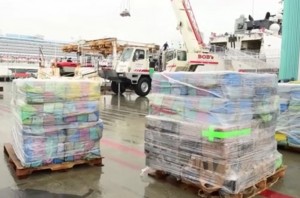
SAN DIEGO – The U.S. Coast Guard offloaded more than 14 tons of cocaine Thursday, at San Diego’s Broadway Pier.
The drugs were seized in the Eastern Pacific Ocean drug transit zone off the coast of Central and South America.
The haul represented 13 vessel interdictions and one bale recovery between late January and early March by the Coast Guard Cutters Bertholf and Valiant, and the USS Lassen with a Coast Guard Law Enforcement Detachment aboard.
“Taking tons of deadly drugs off the street and apprehending dozens of suspected smugglers not only saves lives here at home, but it also disrupts the efforts of international drug trafficking organizations who spread violence and instability wherever they operate,” said Rear Admiral Joseph Servidio, commander, 11th Coast Guard District. “The men and women who serve aboard these ships – along with crews from all our partner agencies and nations — risk their lives to help keep us secure. We owe them our deepest gratitude.”
Of the 14 interdictions represented in the offload, Bertholf was responsible for six, the largest being approximately 6.4 tons discovered aboard a self-propelled semi-submersible vessel intercepted on March 3. Valiant also nabbed six suspected smuggling vessels, and the Lassen, with its embarked Coast Guard LEDET, stopped one suspected smuggling vessel and also recovered approximately 1,500 pounds of cocaine bales found floating in the region.
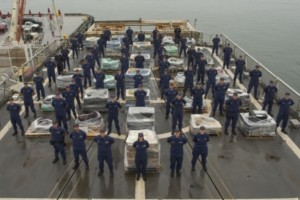
Coast Guardsmen operating from cutters, U.S. Navy ships and international partner nation ships seized more than 158,000 pounds of cocaine in the Eastern Pacific drug traffic zone in fiscal year 2015 — more than the totals in 2012, 2013 and 2014 combined.
Numerous U.S. agencies from the Departments of Defense, Justice and Homeland Security are involved in the effort to combat transnational organized crime including the Coast Guard, Navy, Customs and Border Protection, FBI, DEA, and ICE. Allied and international partner agencies play an important role in counter drug operations. The fight against transnational organized crime networks in the Eastern Pacific requires unity of effort in all phases from detection, monitoring and interdictions, to prosecutions by U.S. Attorneys in California, on the East Coast, and in the Caribbean.
[xyz-ihs snippet=”adsense-body-ad”]Transnational organized crime groups are vying for control of illicit trafficking routes and power in numerous Latin American countries, resulting in increased violence and instability. This has led to record high homicide rates in Central and South America, as well as the Caribbean; 8 of the 10 countries with the highest homicide rates in the world are in this region.
The Coast Guard has increased U.S. and allied presence in the Eastern Pacific Ocean and Caribbean Basin, which are known drug transit zones off of Central and South America, as part of its Western Hemisphere Strategy. During at-sea interdictions in international waters, a suspect vessel is initially located and tracked by allied military or law enforcement aircraft or vessels. The interdictions, including the actual boarding are led and conducted by U.S. Coast Guardsmen. The law enforcement phase of counter-smuggling operations in the Pacific are conducted under the authority of the 11th Coast Guard District headquartered in Alameda.
Bertholf is a 418-foot national security cutter homeported in Alameda, California. Valiant is a 210-foot cutter based in Mayport, Florida. Lassen is home ported in Jacksonville, Florida.
Source: US Coast Guard

